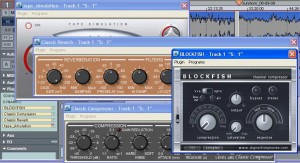Pondering the Price of Plugins
For the uninitiated, “plugins” are the software effects that can be plugged in to your DAW recording software to add various effects or virtual MIDI instruments to your recordings. There are a few proprietary formats of plugins that are only supported by a specific DAW software, as well as the industry-standard VST plugin format that was developed by Steinberg and is supported by most every other DAW software on the market.
The DAW software that I use (Samplitude) happens to support the VST plugin format (as well as DirectX), so I’ve spent a lot of time scouring the net for the best freeware VST plugins. There are many great freebies available, as well as many paid, commerical versions. When comparing free plugins to paid, commerical plugins, it’s only natural that a shrewd shopper would ask: why would I ever buy a commericial plugin when there are so many great freebies available?
Here are a few points to ponder when comparing freeware and paid plugins:
Availability
Is there a freeware version available of the particular effect that you need? If not, your only option may be a commerical plugin. For example, if Plugs-4-U is the only developer on the market who makes a Waveform Discombobulator, you really don’t have a choice.
Quality
Is the freeware version of equal or comparable quality to the commercial versions on the market? Many freeware plugins are great, but they’re pretty stripped-down when it comes to certain features.
Support
What happens if you have a problem with a plugin? Does the developer of the freeware plugin offer any kind of technical support for their product/s? Many developers of freeware plugins are hobbyists, and work another full-time job to keep the bills paid, which doesn’t leave a lot of time for supporting freeware plugins. If they do offer support, there may be a fee involved to compensate them for their time.
Commercial plugin developers, on the other hand, are in the software business to make money. And a big part of making money in the software business is providing good technical support to your customers. Therefore most commercial plugin developers may even have a dedicated technical support staff with a toll-free hotline or web-based support to provide you with a timely response to your issues.
Price Comparison
If you had to buy a hardware version of a particular effect, what would the price be for say 8, or 12, or 16 channels of that effect? For example, let’s say you bought a hardware compressor that costs $200. To buy 8 of those compressors at $200 would be $1600 (ouch). When you think of it in those terms, buying a top-notch compressor VST plugin (that you can use on as many channels as you want in your software mixer) for $200 doesn’t sound like a bad deal at all.
Closing Thoughts
One last note–there are pirated versions of many paid commercial plugins that you can find on the net without searching very hard for very long. You may think some plugins are over-priced, and maybe some are–so don’t buy them. But put yourself in the developer’s shoes. Imagine if you were an employee of that software company who has a wife and kids to feed at home. How would it make you feel to pour your blood, sweat, and tears into your work, only to have someone post a cracked version online for all the world to download and use for free. Not a pleasant feeling. Not to mention the fact that you are breaking the law for downloading and installing said plugins and could face a hefty fine or jail time if you get caught.
And imagine, if everyone downloaded and used cracked versions, those companies would go out of business in a hurry, which would be bad for everyone. If there were no companies willing to spend money on R & D to develop new plugins, there would not only be no commericial versions available, there wouldn’t be too many freeware versions either, because many freeware plugins are modeled after their commercial counterparts. So do everyone a favor (including your own conscience), and pay for the plugins you use.
 August 27, 2009
|
Posted by Jon (admin)
August 27, 2009
|
Posted by Jon (admin)


 Categories:
Categories:  Tags:
Tags: 